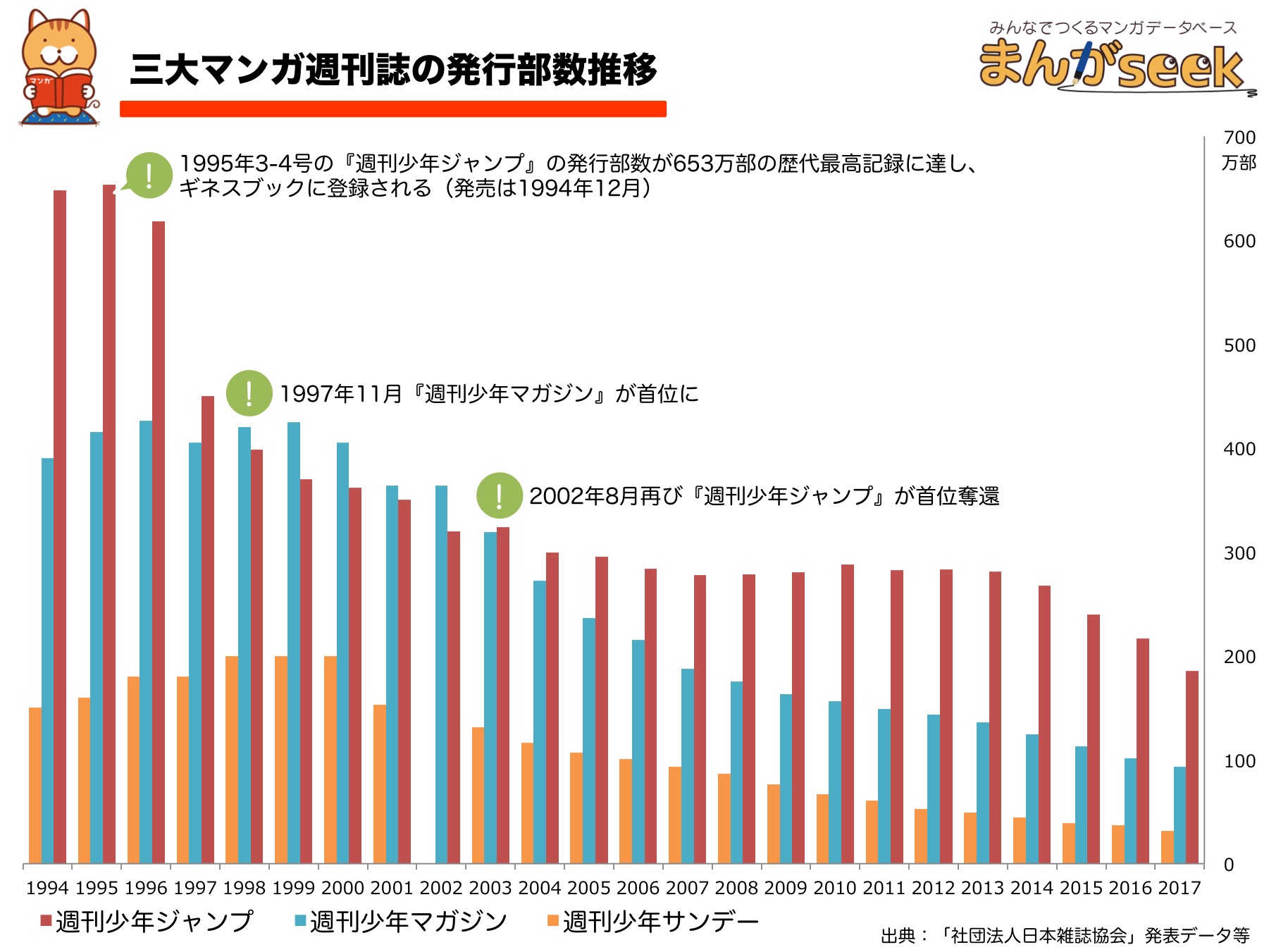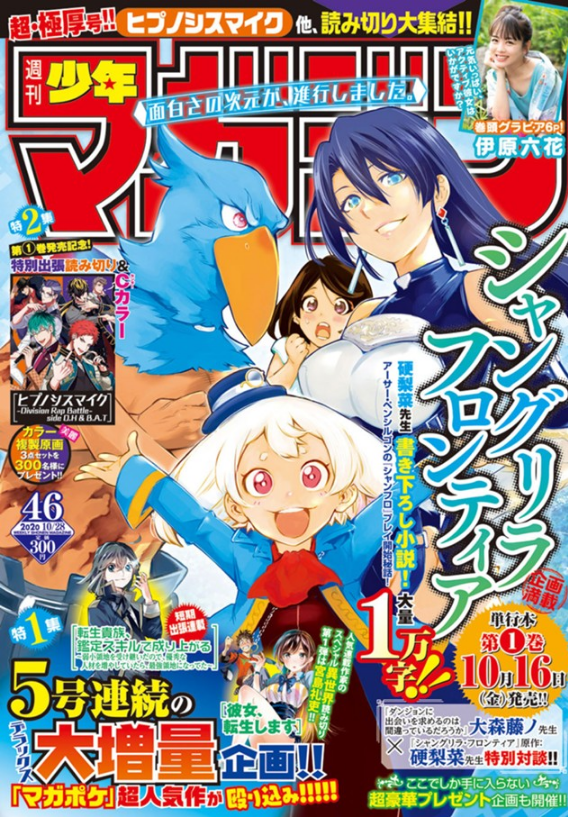 |
| Jump X Magazine - Shuesha, Kodansha |
Magazine and Jump have been the two top shonen magazines for over the past two decades. This was not always the case but that is a story for another time. Instead of looking at the past here, we will be looking at the moment of each magazine and how they match up against each other in various ways.
Current Situation
Jump has for the first time since the 70s dipped under 1.5 million copies in circulation every week. This does not necessarily spell a crisis for the magazine but it is more a sign of the changing times for physical magazines overall. The rise of the digital age has inevitably played a part in causing this as the digital version is easily available to buy in all devices at a touch of a hand. This has probably caused physical copies buyers to migrate to digital to a certain extent. However, the decline in circulation of shonen magazines in general is a trend that comes from before the shift to the digital for most magazines. It was back in the early 2000s that Jump and other shonen magazines started to slowly decline in circulation. In more recent times this decline became stronger as the shift to digital probably only further boosted this already ongoing decline.
 |
| The gradual decline of Weekly Shonen Magazines over the years |
Magazine also has seen its circulation n hit all time low levels, with its latest number revealed by the Japanese Magazine Publishers Association (JMPA) being just over 500k, a number that is like Jump the lowest for Magazine since the 70s. Therefore, it has had to adapt itself to this new reality but that was not too difficult, after all Magazine has always been a shonen magazine with greater flexibility in its content. In addition, to this flexibility one trait Magazine is a associated with is its use of veterans, more than any other shonen magazine.
This use of veterans is deeply imbedded into the editorial department corporate line and it has not strayed from away from it in a a long time. Authors like Hiro Mashima, who is writing Eden's Zero which is currently serialised in the magazine has a long history with Wekly Shonen Magazine like many other veterans like Kouji Seo (Megami no Cafe Terrace), Miki Yoshikawa (A Couple of Cuckoo's Fiance) and Tsuyushi Yasuda. All these authors had hits if not multiple hits in the magazine. Tsuyushi Yasuda bid goodbye to the magazine earlier this year when his hit series 'DAYS' ended after many years. 'DAYS' was his second hit in the magazine after 'Over Drive' and a return in the future is probably not a remote possibility. Kouji Seo and Miki Yoshikawa might more so than Tsuyushi Yasuda be more closely associated with the magazine in a way similar to the level of Hiro Mashima. Of course, thats because these three authors had not only multiple hit series but for the most part of the last two decades they have had ongoing series in the magazine.
 |
| Edens Zero - Hiro Mashima Latest Work |
This focus on veterans is a core pillar of Magazine. The origin of this is from how these authors have not changed their art or story style significantly over time, which means they constantly try to hit a similar audience. One example of this is Miki Yoshikawa, who is writing 'A Couple of Cuckoo's Fiancee', a harem romance comedy series. This is not her first time writing a romance comedy series, in fact she previously also for Magazine penned 'Yankee-kun and Megane-chan' but also 'Yamada and The Seven Witches' which were both romance comedy series themselves. The thirst for romance comedy series exist in basically all shonen magazines over the years and Magazine can fill that with a veteran like Miki Yoshikawa who always manages to garner an audience for her works. Not all veterans succeed at this, but the ones that do over time hold a level of popularity. This is important because these veterans that succeeded are seen as reliable by the editorial depart since they can always craft a series that will strike the chords of a specific audience. In a sense this shows how both the author and their editors clearly understand the magazine's reader wants.
Jump on the other hand has never had a large present of veterans in its line up. However, this might be changing somewhat recently with a few veterans returning with new series. Just within the last months the return of Shimabukuro Mitsuhashi (Toriko), Matsui Yusei (Assassination Classroom) and Kenta Shinohara (Sket Dance) showed that Jump is not unwilling to bring veterans back into the magazine. We could draw more from this turn than it probably means in practice. Mitsuhashi and Matsui both had not actively worked in any series since they had ended 'Toriko' and 'Assassination Classroom' respectively. Kenta Shinohara wrote 'Kanata Astra' but since it had ended in 2018, he had not actively published anything.
 |
| Build King by Shimabukuro Mitsuhashi (Toriko) |
One could draw the turn to this authors as a sort of crisis with the end of Demon Slayer at the same time as there was a shift in the magazine base which left it with many new series that have not become exactly big hits on the eyes of Jump such as 'Mission: Yozakura Family' or 'Undead Unluck'. On the other hand, one could also see this as just as natural if these veterans sought to be published in the magazine again and the editorial department liked their proposals more so than other newbies. One could subscribe to one or the other but it is probably a mix of the two. But why is this important to begin with?
 |
| Undead Unluck Vol 3 |
One reason this turn to veterans is relevant is because of how Jump is a massive magnet for upcoming authors. There are many reasons for this, but one reason is because the massively popular works from Jump of the 90s and 2000s are what a lot of promising young manga artist enjoyed in their youth. So, Jump has a massive stream of young authors in its ranks and the editorial department grooms these authors into possible hit writers like Gotouge Kiyoharu (Demon Slayer) and Akutami Gege (Jujutsu Kaisen) but of course not all of them turn out like these two. Most are not successful and one would be probably be safe to say that this turn to veterans is probably because the newbies proposing for serialisation at the moment are not ready or good enough yet.
Magazine is rather different is this aspect in that it resembles Champion, in that whilst it also grooms newbies through its manga awards and the likes, it often serialises author with origins from outside Magazine or even with Kodansha. Cases of this involve Suzuki Nakaba (Seven Deadly Sins) and Atsushi Okubo (Fire Force) and Shinobu Ohtaka (Orient) all reasonably experienced veterans with successes elsewhere that later came to Magazine. The willingness to turn to authors from other magazines and publishers is in part the reason Magazine is more flexible than Sunday and Jump when it comes to its content even though it still clearly has certain popular trends it follow. The most recent of which is harem romance comedy series and this had lead the editorial department to serialise many of them in recent times.
 |
| Shangri-La Frontier in the Cover of Magazine |
One clear example of the flexibility of Magazine is how it turned to a series like 'Shangri-La Frontier'. Shangri-La Frontier is an adaptation of a popular novel but it is not a light novel but a webnovel from the popular website 'Narou no Shousetsuka.'In a previous post I explore the website in more detail, however the most important thing to know here is that the series already had a big audience from the novel. In a similar way it resembles the Bakemonogatari manga adaptation by 'Oh Great' currently serialising in the magazine as well. Turning to adaptation of popular works with an established audiences is something many publishers like Kadokawa and many other have done to exploit their focus on light novels and the recent isekai trend. However, this is the first time it is brought big publisher brings a series like this to its main magazine and its not hard to understand why, after all it significantly reduces risk since the series has a established fanbase already and the successes of other novel adaptations are evidence that manga adaptation of novels are a big market.
Brand and Multi Media Success
One of the things Jump has a leg up over every other shonen magazine is its massive multimedia success and the brand recognition it continues to hold. Of all big shonen multimedia franchises most of them originate from Jump such as Yu-gi-oh, Naruto, One Piece, Dragon Ball and many others. Through the success of its series it managed to cultivate its own brand in both Japan and the world - the Jump brand with its series becoming associated with Jump through games like Jump Force and the likes.
| Jump+ - Jump Digital Platform |
With its brand name it has managed to launch its digital platform Jump + to become one of the biggest in the market. Its competitors have also fallen behind in this race as well thanks to its brand name and the sheer availability of keen authors to write series for them that others publishers struggle to match.
Magazine has not had the same success with multimedia. It could even be said it falls behind Sunday in this regard due to the presence of Conan in that magazine. In contrast to that Magazine has had many successful series throughout its run but none that had the lasting power to become a long standing multimedia success like One Piece or Conan. However, in a sense this adds to how strong Magazine really is as it has manage to succeed and continue this success till now even without having a series that has achieved such cultural iconic status.
To be Continued...
If you enjoyed reading this and other post here, please consider following the blog and or leaving a comment.





No comments:
Post a Comment